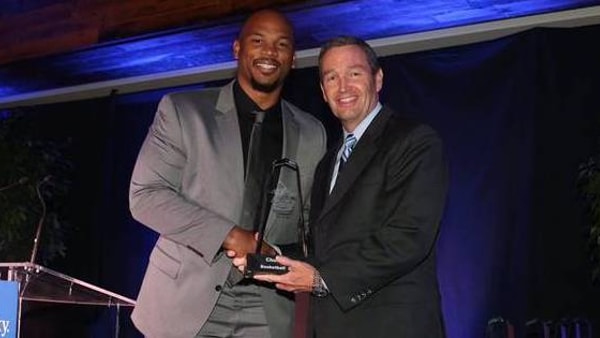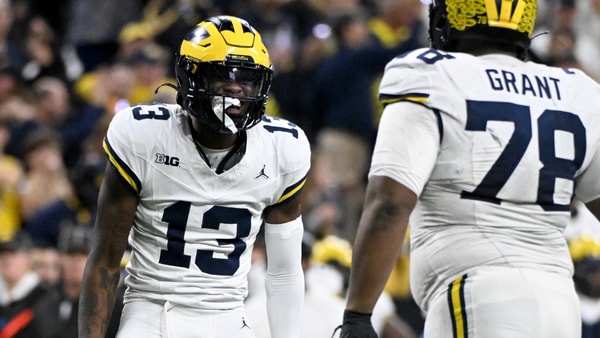
You might not have realized it yet, but this is a momentous week in television history. Twenty-five years ago, at 8:30 EST on Tuesday October 18, 1988, the groundbreaking sitcom
Roseanne first introduced America to the Conner family. Coming at the end of the Reagan era, the Conners were a revelation, a deft subversion of the
Ozzy and Harriet style family dynamics that sitcoms tended to depict in t.v.'s first three decades. When viewers tuned in to watch Roseanne, Dan, and their family, they saw characters that looked and acted a lot more like a regular folks than any fictional family this side of the
Evanses. At the time, too much of the commentary around the show focused on the Conners as a "dysfunctional" family -- a misrepresentation that sadly
still persists -- but the truth was that
Roseanne offered a realistic depiction of a loving family, functioning as well as they could while facing the daily pressures that life threw in their way.
In fact, the way the show dealt with specific types of pressure was what really made it exceptional television. Not only did the Conners look, act, and dress like a lot of us in their audience (and yes, like
modern-day hipsters) they were also, like a lot of us, poor.
Of course, sitcoms about poor and working-class people had been around forever.
Ralph Kramden drove a bus,
Archie Bunker worked on the docks,
Rhoda was a window dresser in a department store, and the characters in
Taxi drove . . . well, taxis. But while all of those characters were identifiable as workers, the writers on those shows rarely made their work -- or lack thereof -- and its financial consequences into major plot points.
Roseanne was different. Both Roseanne and Dan (and that
both is important) held a variety of jobs and were intermittently unemployed throughout the show's run, and changes in their employment had real consequences for both their family and the tone of the show. It sounds like a simple difference, but it's really striking how rarely sitcoms have dealt with the precariousness of living paycheck to paycheck in anything approaching a realistic manner. Before
Roseanne, the best example was
the aforementioned
keeping-their-heads-above-water exploits of the family from
Good Times. But as soon as
J.J. Walker pulled a proto-Urkel and stole the show with his DYN-O-MITE! shtick, the writers on
Good Times felt compelled to leave the serious stuff behind. The dynamics of class on
Roseanne, on the other hand, stuck around throughout the show's nine seasons
. Even the crazed-fever-dream events of the last season, like the Conners winning the lottery, are
eventually explained as fantasies cooked up by the (fictionally)
real Roseanne Conner, a working-class mom from Lanford, Illinois, who had been writing the show all along.
For me, at least, it's that commitment to working class
ness that gives
Roseanne its staying power. When I tune in to one of the countless
Roseanne marathons on
Oxygen or
TV Land or whatever other gazillion channels play the show constantly these days, I get a funny, heartwarming, and -- most importantly -- realistic glance back at what it was like to live in a working-class family in the late eighties and early nineties. And it feels like home.
[caption id="attachment_143617" align="alignnone" width="400"]

Looks a lot like it, too.[/caption]
So why didn't the occasion of
Roseanne's 25th anniversary make more noise? Sure, there were some
superficial retrospectives and (of course)
Roseanne herself spoke up to mark the date, but the internets have been surprisingly absent of the critical hosannas that usually accompany such important milestones.
One answer might be that the show has stayed so ubiquitous over the years that it's simply faded into the wallpaper of popular culture. When an important album, movie, or book reaches a milestone like a twenty-fifth anniversary, there's often a rerelease of some sort, which is generally preceded by some significant period of time spent not really thinking much about it (I know I hadn't listened to
In Utero for at least a couple of years before its twentieth anniversary rerelease prompted me to revisit and reconsider it). T.V. shows are different, though. How can you get any critical distance from a show like
Roseanne when you watched three episodes on three different cable channels just yesterday?
But
Roseanne's ubiquity belies its continued distinctness in the sitcom universe. Maybe we're not making a really big deal about the show's twenty-fifth birthday for the same reasons that so few other sitcoms have successfully taken on its challenge to make class an important part of the dramatic equation. If you measure significance through influence, then the overwhelming favorite for most significant sitcom of the late eighties and early nineties isn't
Roseanne; it's
Seinfeld. All of the best sitcoms of the past twenty years -- here I'm thinking about
Friends,
Arrested Development,
It's Always Sunny in Philadelphia, etc. -- have drawn on
Seinfeld's absurdist take on innate human selfishness, finding most of their laughs in the ridiculous fact that a species so individually self-centered needs to cooperate in order to survive. Like the working-class heroes of t.v.'s past, the characters in these shows all (mostly) have jobs, but the types of jobs they work and the implications that those jobs carry don't really matter to the story.
George Costanza is nearly as precariously employed as either Roseanne or Dan Conner, but when George loses a job, the worst thing that might happen is his mother walking in on him not mastering his own domain in the bathroom. Even the American version of
The Office, which is ostensibly about work, throws out the British version's emphasis on the not-so-quiet desperation of trying to find fulfillment in the washed-out grey of postindustrial work, focusing instead on a rosier, work-is-family tableau. This absurdist streak has even bled through into the flagships of t.v.'s "golden age": the anti-hero prestige dramas.
Tony Soprano,
Don Draper, and
Walter White are more like comic book characters than they are real people; they're extraordinary, towering but cracked monoliths that we watch with awe and pity, not the rough-hewn real-life folks that
Roseanne gives us. Class might be embedded in the structure of all of these shows -- wealth definitely subsidizes the insanity of the characters in
Arrested Development and
It's Always Sunny -- but only to the extent that class is embedded in everything when you look hard enough for it. Overwhelmingly, it's a topic that writers would rather avoid than approach in any real,
Roseanne-influenced way.
The lesson of Roseanne's legacy, then, might be that we'd rather keep reality off of our televisions . . . except for when we wouldn't. If we branch out a bit from the sitcoms we've mentioned, the most influential t.v. show from the
Roseanne era might actually be
The Real World, MTV's early foray into "reality t.v." Over the past two decades, shows based on the semi-scripted format MTV pioneered with
The Real World and perfected with
Laguna Beach/The Hills have filled up a significant portion of the t.v. landscape formerly occupied by sitcoms. Again, though, the quasi-reality of these shows has more often been based in the extraordinary than in the ordinary, focusing on absurd characters and artificial conflict over common people and real problems.

Even with all of it's reality programming, the closest modern t.v. comes to duplicating
Roseanne's realistic depiction of working-class families is . . . and stick with me here . . .
TLC's
Here Comes Honey Boo Boo. If you only know the Shannon/Thompson family of
Honey Boo Boo fame from clips you've seen on
The Soup or late-night talk show monologue jokes, then you're probably considering clicking over to the main
KSR site to read more recruiting news right now. But again, please stay with me. Most of the mainstream commentary around the
Honey Boo Boo family has focused on what some people perceive as their willingness to degrade themselves for attention, whether it be through a child beauty pageant or
farting on t.v. But while there's certainly nothing unproblematic about the carnival-style voyeurism lurking around the edges of the Honey Boo Boo phenomenon, if you actually watch the show, you realize pretty quickly that, like the Conners, the Shannon/Thompsons are a family that loves each other deeply.
And like on Roseanne, the implications of class are everywhere to see. Before the precocious (and legitimately hilarious) Alana scored the family a t.v. deal, Momma June got by on child support and disability thanks to a work-place accident involving a forklift, and paterfamilias Sugar Bear still works his day job in the chalk mine. Accordingly, the family's home, lifestyle, and don't-care-what-you-think-of-me attitude is representative of a very specific strain of working-class Southern culture that's even distinct from the more bourgeois outdoorsism of the (equally hilarious) Robertson family on A&E's Duck Dynasty. Ultimately, though, it's pretty impossible to make a reality show about a working-class family really about what it's like to live in a working-class family when everyone knows that the family is getting well-paid to be on the show. So again, the "Rosie gets laid off at the factory" or the "Dan can't find any drywall work because housing construction has dried up" story lines that drove many of the best Roseanne episodes aren't found anywhere on t.v. except for . . . well . . . on Roseanne.
If all you want from a t.v. show is a chance to escape -- which is a totally valid desire, by the way -- then you're probably ok with the lack of any shows as true to working-class life as
Roseanne. And don't get me wrong, I like escape too. There's nothing overtly realistic about
Buffy the Vampire Slayer or
Firefly and I love both of those shows. But a part of me thinks that all of our lives would be a little bit better if producers of popular culture were brave enough to give us shows like
Roseanne more often. The reasonably affluent middle has been falling out of the American economy since the 1970s, and that trend has only worsened since 2008. It seems like we would be ripe for a show like
Roseanne, to remind those of us who struggle day by day that we're not the only ones, and -- most importantly -- that we can all get by a whole lot easier if we just stick together.
 You might not have realized it yet, but this is a momentous week in television history. Twenty-five years ago, at 8:30 EST on Tuesday October 18, 1988, the groundbreaking sitcom Roseanne first introduced America to the Conner family. Coming at the end of the Reagan era, the Conners were a revelation, a deft subversion of the Ozzy and Harriet style family dynamics that sitcoms tended to depict in t.v.'s first three decades. When viewers tuned in to watch Roseanne, Dan, and their family, they saw characters that looked and acted a lot more like a regular folks than any fictional family this side of the Evanses. At the time, too much of the commentary around the show focused on the Conners as a "dysfunctional" family -- a misrepresentation that sadly still persists -- but the truth was that Roseanne offered a realistic depiction of a loving family, functioning as well as they could while facing the daily pressures that life threw in their way.
In fact, the way the show dealt with specific types of pressure was what really made it exceptional television. Not only did the Conners look, act, and dress like a lot of us in their audience (and yes, like modern-day hipsters) they were also, like a lot of us, poor.
Of course, sitcoms about poor and working-class people had been around forever. Ralph Kramden drove a bus, Archie Bunker worked on the docks, Rhoda was a window dresser in a department store, and the characters in Taxi drove . . . well, taxis. But while all of those characters were identifiable as workers, the writers on those shows rarely made their work -- or lack thereof -- and its financial consequences into major plot points. Roseanne was different. Both Roseanne and Dan (and that both is important) held a variety of jobs and were intermittently unemployed throughout the show's run, and changes in their employment had real consequences for both their family and the tone of the show. It sounds like a simple difference, but it's really striking how rarely sitcoms have dealt with the precariousness of living paycheck to paycheck in anything approaching a realistic manner. Before Roseanne, the best example was the aforementioned keeping-their-heads-above-water exploits of the family from Good Times. But as soon as J.J. Walker pulled a proto-Urkel and stole the show with his DYN-O-MITE! shtick, the writers on Good Times felt compelled to leave the serious stuff behind. The dynamics of class on Roseanne, on the other hand, stuck around throughout the show's nine seasons. Even the crazed-fever-dream events of the last season, like the Conners winning the lottery, are eventually explained as fantasies cooked up by the (fictionally) real Roseanne Conner, a working-class mom from Lanford, Illinois, who had been writing the show all along.
For me, at least, it's that commitment to working classness that gives Roseanne its staying power. When I tune in to one of the countless Roseanne marathons on Oxygen or TV Land or whatever other gazillion channels play the show constantly these days, I get a funny, heartwarming, and -- most importantly -- realistic glance back at what it was like to live in a working-class family in the late eighties and early nineties. And it feels like home.
[caption id="attachment_143617" align="alignnone" width="400"]
You might not have realized it yet, but this is a momentous week in television history. Twenty-five years ago, at 8:30 EST on Tuesday October 18, 1988, the groundbreaking sitcom Roseanne first introduced America to the Conner family. Coming at the end of the Reagan era, the Conners were a revelation, a deft subversion of the Ozzy and Harriet style family dynamics that sitcoms tended to depict in t.v.'s first three decades. When viewers tuned in to watch Roseanne, Dan, and their family, they saw characters that looked and acted a lot more like a regular folks than any fictional family this side of the Evanses. At the time, too much of the commentary around the show focused on the Conners as a "dysfunctional" family -- a misrepresentation that sadly still persists -- but the truth was that Roseanne offered a realistic depiction of a loving family, functioning as well as they could while facing the daily pressures that life threw in their way.
In fact, the way the show dealt with specific types of pressure was what really made it exceptional television. Not only did the Conners look, act, and dress like a lot of us in their audience (and yes, like modern-day hipsters) they were also, like a lot of us, poor.
Of course, sitcoms about poor and working-class people had been around forever. Ralph Kramden drove a bus, Archie Bunker worked on the docks, Rhoda was a window dresser in a department store, and the characters in Taxi drove . . . well, taxis. But while all of those characters were identifiable as workers, the writers on those shows rarely made their work -- or lack thereof -- and its financial consequences into major plot points. Roseanne was different. Both Roseanne and Dan (and that both is important) held a variety of jobs and were intermittently unemployed throughout the show's run, and changes in their employment had real consequences for both their family and the tone of the show. It sounds like a simple difference, but it's really striking how rarely sitcoms have dealt with the precariousness of living paycheck to paycheck in anything approaching a realistic manner. Before Roseanne, the best example was the aforementioned keeping-their-heads-above-water exploits of the family from Good Times. But as soon as J.J. Walker pulled a proto-Urkel and stole the show with his DYN-O-MITE! shtick, the writers on Good Times felt compelled to leave the serious stuff behind. The dynamics of class on Roseanne, on the other hand, stuck around throughout the show's nine seasons. Even the crazed-fever-dream events of the last season, like the Conners winning the lottery, are eventually explained as fantasies cooked up by the (fictionally) real Roseanne Conner, a working-class mom from Lanford, Illinois, who had been writing the show all along.
For me, at least, it's that commitment to working classness that gives Roseanne its staying power. When I tune in to one of the countless Roseanne marathons on Oxygen or TV Land or whatever other gazillion channels play the show constantly these days, I get a funny, heartwarming, and -- most importantly -- realistic glance back at what it was like to live in a working-class family in the late eighties and early nineties. And it feels like home.
[caption id="attachment_143617" align="alignnone" width="400"] Looks a lot like it, too.[/caption]
So why didn't the occasion of Roseanne's 25th anniversary make more noise? Sure, there were some superficial retrospectives and (of course) Roseanne herself spoke up to mark the date, but the internets have been surprisingly absent of the critical hosannas that usually accompany such important milestones.
One answer might be that the show has stayed so ubiquitous over the years that it's simply faded into the wallpaper of popular culture. When an important album, movie, or book reaches a milestone like a twenty-fifth anniversary, there's often a rerelease of some sort, which is generally preceded by some significant period of time spent not really thinking much about it (I know I hadn't listened to In Utero for at least a couple of years before its twentieth anniversary rerelease prompted me to revisit and reconsider it). T.V. shows are different, though. How can you get any critical distance from a show like Roseanne when you watched three episodes on three different cable channels just yesterday?
But Roseanne's ubiquity belies its continued distinctness in the sitcom universe. Maybe we're not making a really big deal about the show's twenty-fifth birthday for the same reasons that so few other sitcoms have successfully taken on its challenge to make class an important part of the dramatic equation. If you measure significance through influence, then the overwhelming favorite for most significant sitcom of the late eighties and early nineties isn't Roseanne; it's Seinfeld. All of the best sitcoms of the past twenty years -- here I'm thinking about Friends, Arrested Development, It's Always Sunny in Philadelphia, etc. -- have drawn on Seinfeld's absurdist take on innate human selfishness, finding most of their laughs in the ridiculous fact that a species so individually self-centered needs to cooperate in order to survive. Like the working-class heroes of t.v.'s past, the characters in these shows all (mostly) have jobs, but the types of jobs they work and the implications that those jobs carry don't really matter to the story. George Costanza is nearly as precariously employed as either Roseanne or Dan Conner, but when George loses a job, the worst thing that might happen is his mother walking in on him not mastering his own domain in the bathroom. Even the American version of The Office, which is ostensibly about work, throws out the British version's emphasis on the not-so-quiet desperation of trying to find fulfillment in the washed-out grey of postindustrial work, focusing instead on a rosier, work-is-family tableau. This absurdist streak has even bled through into the flagships of t.v.'s "golden age": the anti-hero prestige dramas. Tony Soprano, Don Draper, and Walter White are more like comic book characters than they are real people; they're extraordinary, towering but cracked monoliths that we watch with awe and pity, not the rough-hewn real-life folks that Roseanne gives us. Class might be embedded in the structure of all of these shows -- wealth definitely subsidizes the insanity of the characters in Arrested Development and It's Always Sunny -- but only to the extent that class is embedded in everything when you look hard enough for it. Overwhelmingly, it's a topic that writers would rather avoid than approach in any real, Roseanne-influenced way.
The lesson of Roseanne's legacy, then, might be that we'd rather keep reality off of our televisions . . . except for when we wouldn't. If we branch out a bit from the sitcoms we've mentioned, the most influential t.v. show from the Roseanne era might actually be The Real World, MTV's early foray into "reality t.v." Over the past two decades, shows based on the semi-scripted format MTV pioneered with The Real World and perfected with Laguna Beach/The Hills have filled up a significant portion of the t.v. landscape formerly occupied by sitcoms. Again, though, the quasi-reality of these shows has more often been based in the extraordinary than in the ordinary, focusing on absurd characters and artificial conflict over common people and real problems.
Looks a lot like it, too.[/caption]
So why didn't the occasion of Roseanne's 25th anniversary make more noise? Sure, there were some superficial retrospectives and (of course) Roseanne herself spoke up to mark the date, but the internets have been surprisingly absent of the critical hosannas that usually accompany such important milestones.
One answer might be that the show has stayed so ubiquitous over the years that it's simply faded into the wallpaper of popular culture. When an important album, movie, or book reaches a milestone like a twenty-fifth anniversary, there's often a rerelease of some sort, which is generally preceded by some significant period of time spent not really thinking much about it (I know I hadn't listened to In Utero for at least a couple of years before its twentieth anniversary rerelease prompted me to revisit and reconsider it). T.V. shows are different, though. How can you get any critical distance from a show like Roseanne when you watched three episodes on three different cable channels just yesterday?
But Roseanne's ubiquity belies its continued distinctness in the sitcom universe. Maybe we're not making a really big deal about the show's twenty-fifth birthday for the same reasons that so few other sitcoms have successfully taken on its challenge to make class an important part of the dramatic equation. If you measure significance through influence, then the overwhelming favorite for most significant sitcom of the late eighties and early nineties isn't Roseanne; it's Seinfeld. All of the best sitcoms of the past twenty years -- here I'm thinking about Friends, Arrested Development, It's Always Sunny in Philadelphia, etc. -- have drawn on Seinfeld's absurdist take on innate human selfishness, finding most of their laughs in the ridiculous fact that a species so individually self-centered needs to cooperate in order to survive. Like the working-class heroes of t.v.'s past, the characters in these shows all (mostly) have jobs, but the types of jobs they work and the implications that those jobs carry don't really matter to the story. George Costanza is nearly as precariously employed as either Roseanne or Dan Conner, but when George loses a job, the worst thing that might happen is his mother walking in on him not mastering his own domain in the bathroom. Even the American version of The Office, which is ostensibly about work, throws out the British version's emphasis on the not-so-quiet desperation of trying to find fulfillment in the washed-out grey of postindustrial work, focusing instead on a rosier, work-is-family tableau. This absurdist streak has even bled through into the flagships of t.v.'s "golden age": the anti-hero prestige dramas. Tony Soprano, Don Draper, and Walter White are more like comic book characters than they are real people; they're extraordinary, towering but cracked monoliths that we watch with awe and pity, not the rough-hewn real-life folks that Roseanne gives us. Class might be embedded in the structure of all of these shows -- wealth definitely subsidizes the insanity of the characters in Arrested Development and It's Always Sunny -- but only to the extent that class is embedded in everything when you look hard enough for it. Overwhelmingly, it's a topic that writers would rather avoid than approach in any real, Roseanne-influenced way.
The lesson of Roseanne's legacy, then, might be that we'd rather keep reality off of our televisions . . . except for when we wouldn't. If we branch out a bit from the sitcoms we've mentioned, the most influential t.v. show from the Roseanne era might actually be The Real World, MTV's early foray into "reality t.v." Over the past two decades, shows based on the semi-scripted format MTV pioneered with The Real World and perfected with Laguna Beach/The Hills have filled up a significant portion of the t.v. landscape formerly occupied by sitcoms. Again, though, the quasi-reality of these shows has more often been based in the extraordinary than in the ordinary, focusing on absurd characters and artificial conflict over common people and real problems.
 Even with all of it's reality programming, the closest modern t.v. comes to duplicating Roseanne's realistic depiction of working-class families is . . . and stick with me here . . . TLC's Here Comes Honey Boo Boo. If you only know the Shannon/Thompson family of Honey Boo Boo fame from clips you've seen on The Soup or late-night talk show monologue jokes, then you're probably considering clicking over to the main KSR site to read more recruiting news right now. But again, please stay with me. Most of the mainstream commentary around the Honey Boo Boo family has focused on what some people perceive as their willingness to degrade themselves for attention, whether it be through a child beauty pageant or farting on t.v. But while there's certainly nothing unproblematic about the carnival-style voyeurism lurking around the edges of the Honey Boo Boo phenomenon, if you actually watch the show, you realize pretty quickly that, like the Conners, the Shannon/Thompsons are a family that loves each other deeply.
And like on Roseanne, the implications of class are everywhere to see. Before the precocious (and legitimately hilarious) Alana scored the family a t.v. deal, Momma June got by on child support and disability thanks to a work-place accident involving a forklift, and paterfamilias Sugar Bear still works his day job in the chalk mine. Accordingly, the family's home, lifestyle, and don't-care-what-you-think-of-me attitude is representative of a very specific strain of working-class Southern culture that's even distinct from the more bourgeois outdoorsism of the (equally hilarious) Robertson family on A&E's Duck Dynasty. Ultimately, though, it's pretty impossible to make a reality show about a working-class family really about what it's like to live in a working-class family when everyone knows that the family is getting well-paid to be on the show. So again, the "Rosie gets laid off at the factory" or the "Dan can't find any drywall work because housing construction has dried up" story lines that drove many of the best Roseanne episodes aren't found anywhere on t.v. except for . . . well . . . on Roseanne.
If all you want from a t.v. show is a chance to escape -- which is a totally valid desire, by the way -- then you're probably ok with the lack of any shows as true to working-class life as Roseanne. And don't get me wrong, I like escape too. There's nothing overtly realistic about Buffy the Vampire Slayer or Firefly and I love both of those shows. But a part of me thinks that all of our lives would be a little bit better if producers of popular culture were brave enough to give us shows like Roseanne more often. The reasonably affluent middle has been falling out of the American economy since the 1970s, and that trend has only worsened since 2008. It seems like we would be ripe for a show like Roseanne, to remind those of us who struggle day by day that we're not the only ones, and -- most importantly -- that we can all get by a whole lot easier if we just stick together.
Even with all of it's reality programming, the closest modern t.v. comes to duplicating Roseanne's realistic depiction of working-class families is . . . and stick with me here . . . TLC's Here Comes Honey Boo Boo. If you only know the Shannon/Thompson family of Honey Boo Boo fame from clips you've seen on The Soup or late-night talk show monologue jokes, then you're probably considering clicking over to the main KSR site to read more recruiting news right now. But again, please stay with me. Most of the mainstream commentary around the Honey Boo Boo family has focused on what some people perceive as their willingness to degrade themselves for attention, whether it be through a child beauty pageant or farting on t.v. But while there's certainly nothing unproblematic about the carnival-style voyeurism lurking around the edges of the Honey Boo Boo phenomenon, if you actually watch the show, you realize pretty quickly that, like the Conners, the Shannon/Thompsons are a family that loves each other deeply.
And like on Roseanne, the implications of class are everywhere to see. Before the precocious (and legitimately hilarious) Alana scored the family a t.v. deal, Momma June got by on child support and disability thanks to a work-place accident involving a forklift, and paterfamilias Sugar Bear still works his day job in the chalk mine. Accordingly, the family's home, lifestyle, and don't-care-what-you-think-of-me attitude is representative of a very specific strain of working-class Southern culture that's even distinct from the more bourgeois outdoorsism of the (equally hilarious) Robertson family on A&E's Duck Dynasty. Ultimately, though, it's pretty impossible to make a reality show about a working-class family really about what it's like to live in a working-class family when everyone knows that the family is getting well-paid to be on the show. So again, the "Rosie gets laid off at the factory" or the "Dan can't find any drywall work because housing construction has dried up" story lines that drove many of the best Roseanne episodes aren't found anywhere on t.v. except for . . . well . . . on Roseanne.
If all you want from a t.v. show is a chance to escape -- which is a totally valid desire, by the way -- then you're probably ok with the lack of any shows as true to working-class life as Roseanne. And don't get me wrong, I like escape too. There's nothing overtly realistic about Buffy the Vampire Slayer or Firefly and I love both of those shows. But a part of me thinks that all of our lives would be a little bit better if producers of popular culture were brave enough to give us shows like Roseanne more often. The reasonably affluent middle has been falling out of the American economy since the 1970s, and that trend has only worsened since 2008. It seems like we would be ripe for a show like Roseanne, to remind those of us who struggle day by day that we're not the only ones, and -- most importantly -- that we can all get by a whole lot easier if we just stick together.







Discuss This Article
Comments have moved.
Join the conversation and talk about this article and all things Kentucky Sports in the new KSR Message Board.
KSBoard